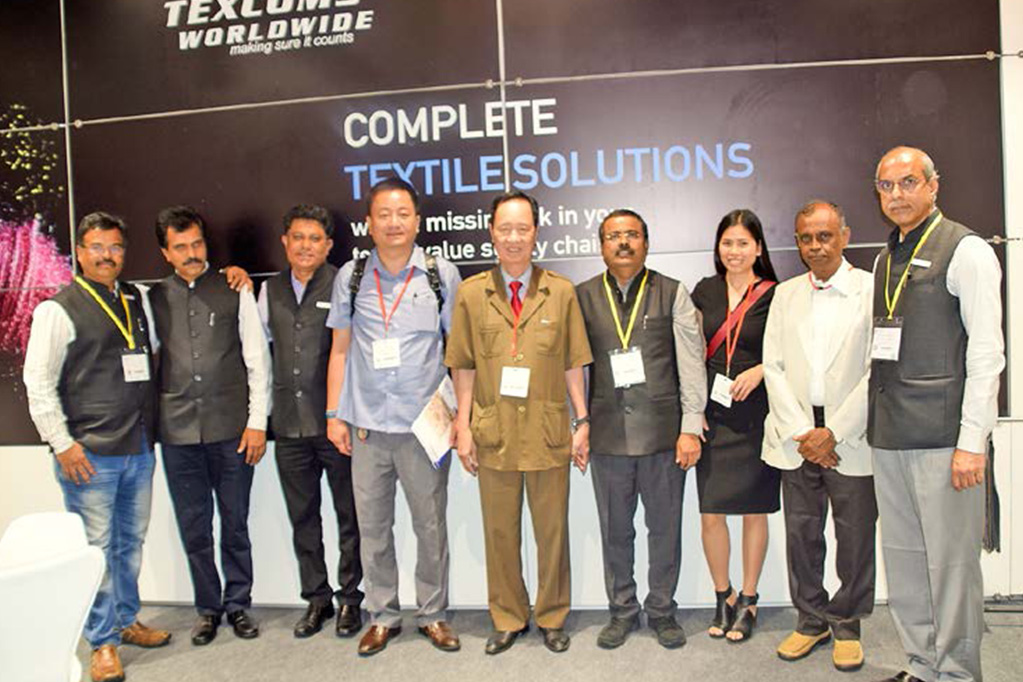Mr. Boobalan exclusive interview to The Textile Magazine
In the interview to the textile magazine, Mr. Boobalan, Founder and CEO of our company, spoke in detail about Texcoms Worldwide’s eventful journey so far, its key focus areas, strengths and future plans, among others.
Excerpts:
The growth story of Texcoms Worldwide, similar to that of several successful enterprises, began with one man’s dream. Recalling his humble beginnings in the industry, Mr. Boobalan said: “I had a dream in my childhood to become an entrepreneur and a business leader. Back in the day I had to endure all the hardships in life such as trying to finish college studies, surviving with a meagre internship salary and the harsh reality of dealing with society during hard times. But, my dream kept me going.”
Mr. Boobalan was always been a believer in people, relationship, friendship and society. It mattered a lot more than mere survival. Since the start of his career, he formed close bonds with people and maintained a wide network of relationships and constantly made efforts to renew and keep them alive.
All through the years he developed a formidable network of connections. Very little did he know back then that this would help him grow professionally and personally. There were times when he was questioned by his friends about how one could start a business without capital. And the reply had always been that the network he had developed would help him somehow start a business.
He said: “I had for the first time come to see a family business being run professionally through my association with Premier Mills as its employee. Chairman R. Jagadeesh Chandran’s dynamism had profound influence on my attitude as a professional leader and further strengthened my resolve to start a business.”
To his surprise Mr. Boobalan had to leave for Indonesia as an employee in the multinational company, Indorama Synthetics. True to his spirit, he had again made friends and formed a wider network in a new land. Whenever he met like-minded friends, he had always been drawn to discussing the business world. Mr. Willi Goldschmidt, a businessman, found an innate talent in him and offered an opportunity to help him with the leading spareparts division of his business. This is the first time he had ever come close to running a business himself, and he seized the opportunity to the best of his potential. Shortly after joining Mr. Willi in Indonesia, he started a business in India joining hands with his close friend Mr. Arunagiri, after which Textechindo (India) Pvt. Ltd. was born in 2002.
Mr. Boobalan further observed: “Passion to excel in business always compelled me to think big and do things differently. Parting ways with Mr. Willi, who moved on to start energy business, we started our own company known as PT. Texcoms in 2006 in Indonesia with the close friends, Mr. Thaker and Mr. Bambang, as partners. Also we founded Eastern Ghats International Private Ltd. and further went on to form companies and divisions in multiple countries at the global level under the Texcoms Worldwide brand. Today group companies have multiple revenue sources and could employ hundreds of people and operate across all continents with partnerships and joint ventures. Again it is the well established network and mutual trust with people all over the world that has helped raise the status of Texcoms Worldwide. Today, it operates through three main business divisions – used machinery trading headed by Mr. Thaker, yarn and fabric trading headed by Mr. Sekar and textile management consultancy headed by Mr. Rajaguru Raja.

Partners and clients
Mr. Boobalan recounted the fact that a growing company needed right business partners and clients. Early on a well-established global brand PRECITEX came forward to partner with them for the Indonesian market. Getting a foothold in the industry, the association sustained until today has been one of the prime driving factors strengthening the Texcoms brand. The initial business breakthrough was provided by the biggest business conglomerate from Bangladesh. Its continued trust and repeat orders gave the company wherewithal’s to grow and sustain itself. Business model Mr. Boobalan further elaborated on the unique way the company operates all three different business divisions. The Machinery Division operates in many different areas as the situation demands. Machines are acquired directly from financial institutions through competitive bidding or through direct negotiations with the seller and shipped directly to customers from the factory floor. Machines are shipped to companies’ warehouse facilities in India, Thailand and Indonesia, and refurbished and shipped. On rare occasions the company also buys the entire land, building and machinery, disposes of machines and retains the land and building for its use. The company has so far shipped around 4,000,000 spindles, 2,000 looms and dyeing finishing equipment to more than 600 customers across 30 countries.
The Yarn and Fabric division turns out special products through outsourcing. The in-house research and development team identifies the need for unique design products, develops the process and produces at the approved outsourcing facility. The unique business model affords Yarncoms (yarn and fabric trading division) a complete control over the process and quality. The raw material is sourced globally, added value; gassing, singeing, space dyeing, dyeing, twisting, special fabric finishes, mechanical and chemical, and shipped across the globe. Yarncoms operates with offices in India, Bangladesh, Indonesia, Sri Lanka, Myanmar and Brazil and supplies yarn and fabric across these countries to the global market. The Textile Management Consulting division offers
unique services to help textile mills build new factories, improve performance and manage the complete unit. New customers of the textile industry need a dependable source to design, build, operate and transfer factories, Texcoms Textile Solutions (Textile Management consulting division) offers turnkey project management solutions to these customers. Globally 20% of the textile mills operate efficiently while 80% need help in one or the other form to operate mills efficiently. These customers are offered assistance to improve efficiency of the plant through the customized intervention program. Millennials inheriting textile mills don’t want to be associated with day-to-day management of textile mills. They are assisted through management contract for the complete operation of the unit. The unique services offered are availed of by leading textile institutes and industrial houses.
Texcoms Worldwide is currently engaged by the Ethiopian Textile Industry Development Institute (ETIDI) to capacitate the entire textile institute in Ethiopia, Nice Corporate Services, Nigeria, to build, operate and transfer a fully integrated textile unit spread over 300 hectares, Hamid Fabric Mills, Bangladesh, to design, build, operate and transfer state-of-the-art spinning unit.
Mr. Boobalan emphasized the fact that Texcoms World- Wide is completely a textile industry-focused company both in form and essence.

Future prospects
The textile industry is facing headwinds from brain drain, growing protectionism and rapid technological changes, Mr. Boobalan opined that companies need to embrace change and adapt to new business models as the only means to survive in the future. True to his spirit he started steering the company to adapt to a new reality. The company under his leadership launched two new initiatives – an online platform for used textile machinery and the job platform for textile professionals as well as employers.
The digital platform for used machinery will bring together otherwise highly fragmented non-transparent buyers, sellers and agents to a common platform and enable them to conduct business transparently and ensure clean transactions.
The job platform, dedicated to textile professionals, will enable them to find the right employers and enable them to find the right professionals. The industry is suffering from brain drain and hence employers find it extremely difficult to source talent. This one-stop source should solve this problem for both professionals and employers.
Culture
The company is really proud of having adhered to professional culture. All the employees are free to take decisions at their level and within their domain expertise. Employees are rewarded based on their performance. Business divisions operate with full freedom and authority to take decisions of their own. Divisions are held accountable for results. The professional culture enabled the company to attract and retain top talent in the industry.
Mr. Boobalan concluded the interview with this statement: “A humble beginning, an undying dream and being handheld by a few exceptional individuals shaped who I am today. When no one came to help me at my lowest, a teacher extended his hand to help me finish my college course by providing personal guarantee for a student loan, and I am where I am because people have been there for me. None of this could have been possible but for the undying dream and relentless pursuit of the dream. What I know now I did not know back then, but I pursued the mission that forming relationship and helping people in need can create miracles.”
Article by: M.K. Prabhakar
Source: The Textile Magazine | August – September 2019 | 150-152




